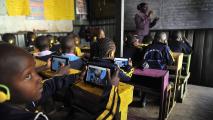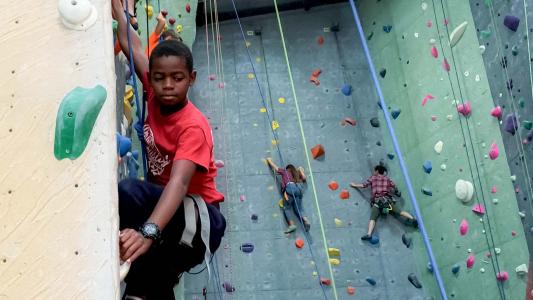Aline Sara is changing the conversation around what it means to be a refugee by talking — literally. Through her startup, NaTakallam (Arabic for “we talk”), Aline pairs refugees with people from other countries who want to learn their language. The “conversation partners” chat over Whatsapp or Skype to improve their Arabic or Spanish. But Aline says that people gain more than just language skills: it is foreign language tutoring with a serving of empathy on the side.
Refugees are people who were forced to leave their homes because they fear war, persecution, or other danger. Many can’t find work outside their home country, so NaTakallam is one option for them. It provides a decent hourly wage for tutoring language students online. But these conversations are also helping others gain a new perspective on what it means to be a refugee.
Freethink talked with Aline about resistance, rewards, and what is next for NaTakallam.
This interview has been edited and condensed for clarity.
Freethink: What kind of response have you received for NaTakallam?
Aline Sara: It’s really human at the core. It’s driven by real deep impacts and the friendships that are arising.
One of the refugees’ laptop broke down, and he couldn’t work anymore, and a student mailed him a laptop. We’ve had students who visit their tutors in Turkey, and in Brazil, and in Costa Rica.
The original idea was dignifying work and turning to refugees while meeting a need — easy, flexible, affordable language learning. But what’s fascinating is that people are craving giving back, in a way that you can actually see the impact. You’re not just donating to a charity that’s going to send you a global report about their impact with photos of children.
The power of this is the one-on-one dynamic. When you’re working with your tutor, and you’re following their story, you’re hearing how they’re doing. So there’s very human and powerful elements that are changing the narrative around refugees, bridging cultures.
Freethink: What is next? What is the next step for NaTakallam?
Aline Sara: We are growing. We’re looking at adding languages. We want to continue bringing our programs in schools. A lot of our school programs relate to culture, and understanding the journey of displacement, not just the language. We really build global active citizens, a globally aware generation.
We want to continue to grow our clients. We’ve worked with private sector clients, we work with NGOs. There’s a lot of companies that are taking on the refugee cause and are supporting refugees and hiring them. Some of them are working with us, to hire us for translation services, for example, but also for their staff language learning needs.
So we plan to just keep growing — to continue to change the narrative around these refugees, continue to bring them livelihood access, and continue to grow the idea that everyone is human, and everyone has something to offer.
Freethink: Can you tell me about a significant moment when you were launching NaTakallam when you knew you were on the right path?
Aline Sara: Being an entrepreneur, and above all, being a social entrepreneur, where you’re constantly struggling with “how do I bring the revenue in, while also making sure I’m making an impact, and that my impact is deep and authentic and legitimate?” — it’s a forever battle.
We would get small examples of setbacks, but also moments of great positive feedback. When you have just a single person tell you that we are the reason they survived, or that we saved their life. When you have a student say that working and taking language classes with their tutor, who happens to be a refugee, has brought them more knowledge and understanding of what it is to be displaced than working for the UN refugee agency or studying the refugee crisis in class.
These are small rewarding things.






